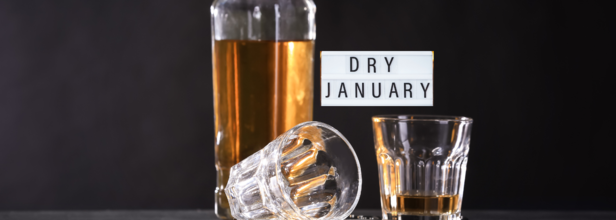
Thinking About Dry January? How To Start and What To Expect
Every new year is an opportunity to turn over a new leaf, and for many people, that turns into a relationship reassessment with alcohol. To that end, enter Dry January, a public health initiative aimed at abstaining from alcohol during the entire month. While not easy, some of the benefits are so worth it that you may find yourself wanting to repeat this journey annually.
Whether you are sober-curious, looking for a health reboot, or just seeking a fresh start, Dry January offers a unique opportunity to explore the impact of an alcohol-free life.
What Is Dry January?
Launched in 2012 by Alcohol Change UK, Dry January began as a public health campaign to promote sobriety for 31 days. It has since grown into a global phenomenon, with millions participating annually.
It is not only for those with alcohol dependency but for those looking to cut back, reassess their habits, or experience the benefits of being free from alcohol. Indeed, recent studies take away the long-held beliefs that moderate drinking is good for one's health and emphasize the dangers of drinking, such as liver damage, cardiovascular problems, and increased cancer risks.
What to Expect When You Stop Drinking Alcohol
Giving up alcohol can have profound effects on your body and mind. However, the first few days may feel like an uphill battle, especially if you’re accustomed to regular drinking.
You might experience symptoms similar to a hangover: headaches, fatigue, and irritability. These symptoms generally fade after three to seven days, replaced by noticeable improvements in energy levels and mood.
Studies show several advantages of not drinking alcohol, even for a short time. Among the most common improvements:
Better Sleep: Alcohol interferes with your sleep cycles, causing fragmented, restless nights. A 2016 study found that 62% of Dry January participants reported improved sleep quality.
Weight Loss: Alcohol is calorie-dense, and skipping your evening drink can cut significant calories. A British study highlighted notable weight loss among participants who abstained for a month.
Clearer Skin: Alcohol can dehydrate your skin, exacerbate conditions like psoriasis, and increase sun sensitivity. Taking a break from drinking can lead to a healthier, more radiant complexion.
Tips To Start Dry January
For many, the toughest part of Dry January is not giving up alcohol itself but the social situations where alcohol is an apparent lubricant. From happy hours to family gatherings, it feels like that glass of wine or beer can be a part of the scene. Here are a few ways to keep your resolve intact:
1. Have a Non-Alcoholic Alternative
Keep sparkling water, soda, or mocktails on hand. Many brands now offer non-alcoholic beers and wines, but be mindful of added sugars.
2. BYOB - Bring Your Own Drinks
Bring your favorite soft drink along while attending an event to save you from the temptation.
3. Be Proud About Your Goals
If people ask why you are not drinking, explain the reason behind your decision confidently. Most of the people will appreciate and even envy your commitment to abstinence.
4. Enlist Support
Getting support from a friend or family member can make it less lonely and more enjoyable
Also Read: Alarming Reality Of Extreme Drinking On Holidays And Occasions
Moderation Vs Abstinence
It is difficult to determine whether one needs to reduce or completely cut out alcohol from their life. Moderation can work for people with mild habits, but for those who have a history of alcohol dependency, abstinence becomes the safer, more sustainable choice.
Ask yourself:
- Do you often drink more than you intended?
- Does alcohol interfere with your relationships, responsibilities, or hobbies?
- Do you turn to booze when you're stressed or feeling lonely?
If you've ever felt physical withdrawal symptoms of shakiness or irritability when you didn't drink for a day, talk to your healthcare provider for help.
Some Tips for Having a Successful Dry January
Making it through Dry January takes both preparation and discipline. Here are some tips that can help:
Reward Yourself
Sober treats await when milestones are reached-a good spa day, a new book, time with nature- to name just a few.
Be Patient With Slip-Ups
When slip-ups happen, do not abandon the challenge. Rather, renew yourself for a new day's approach.
When to Seek Help
Dry January may throw light upon a deeper issue concerning alcohol intake. Some mild symptoms include headache and nausea; more dangerous symptoms such as hallucination, increased heart rate, or a fever signal an extreme level of dependency, in which the subject should see a doctor.
If alcohol severely influences your mental and physical condition, seek counseling or attend meetings such as Alcoholics Anonymous. According to a client's situation, treatments and programs can be implemented to address the issue of alcohol dependency.
While Dry January is a 31-day commitment, its benefits often ripple into other areas of life. Many participants report continuing reduced drinking habits throughout the year. Whether you choose to abstain completely or moderate your intake, this initiative can be the foundation of a healthier lifestyle.
Disclaimer: If alcohol is impacting your well-being or causing distress, it’s important to seek professional medical guidance. Support options such as counseling, medication, and community programs like Alcoholics Anonymous can provide valuable assistance on your journey. Additionally, the National Institute on Alcohol Abuse and Alcoholism offers extensive resources to help individuals reduce or quit alcohol consumption effectively.
2023 NSDUH Detailed Tables. National Survey on Drug Use and Health. 2023
FIND YOUR WAY TO QUALITY ALCOHOL TREATMENT. NIH.
Dry January® challenge? Alcohol Change UK
© 2024 Bennett, Coleman & Company Limited

